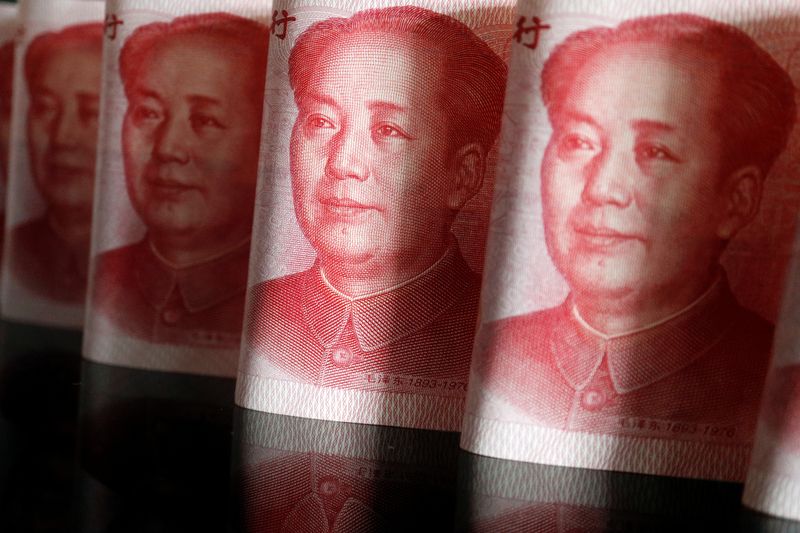
© Reuters. Chinese yuan banknotes are seen in this illustration image taken April 25, 2022. REUTERS/Florence Lo/Illustration
By Samuel Shen and Georgina Lee
SHANGHAI/HONG KONG (Reuters) – China’s progressive internationalisation of its currency will move to its next leg on Monday when about 2 lots Chinese business begin selling their house currency in Hong Kong’s stock exchange.
Hong Kong stocks such as Alibaba (NYSE:-RRB- and Tencent are amongst the 24 stocks which will be priced and sold both yuan and the Hong Kong dollar under the Double Counter Design on the Hong Kong stock market (HKEX) from Monday.
The plan is targeting abroad financiers with yuan holdings at first, however will later on consist of mainland financiers by means of the Hong Kong-China Stock Link link-up later on. deposits in Hong Kong alone are approximated at some 833 billion yuan ($ 117 billion).
Fund supervisors state the action shows Beijing’s desire to broaden making use of yuan outside China and offer another opportunity for yuan-denominated financial investment, therefore minimizing the danger of capital outflows going after greater yielding currencies such as the U.S. dollar.
” China is pressing yuan internationalisation to avoid geopolitical threats and minimize dependence on the dollar, and for that function, you require broader usage of the Chinese currency,” stated Ding Wenjie, strategist of Global Capital expense at China Property Management Co (ChinaAMC).
Ding stated the plan is a significant turning point and anticipates the design to be broadened in future, beyond stocks to bonds and even alternative possessions, enhancing abroad property swimming pools denominated in yuan.
The effort comes in the middle of a consistent stream of bilateral yuan-denominated offers China has actually struck with trading partners, from Chinese oil purchases in the Middle East, to products trade with partners from Brazil to Russia. Beijing has actually kept close ties with Moscow in spite of the intrusion of Ukraine.
The U.S. dollar stays the dominant worldwide currency, representing 42% of worldwide payments. The yuan’s share is simply 2.29%, however is up from 1.95% 2 years earlier.
A considerable development in China’s efforts to promote usage of the yuan came this month, when Pakistan spent for its very first government-to-government import of reduced Russian in yuan.
” When a currency is internationalised, it’s not just utilized in trade, physical products, or services. It likewise needs to be parked in financial investment cars,” stated Dong Chen, Head of Asia Macroeconomic Research Study at Pictet Wealth Management.
For foreign financiers with yuan holdings, “purchasing shares in Hong Kong without actually entering into mainland China will be a much, a lot easier method to park your holdings of this currency,” he stated.
YUAN REWARDS
Under the double counter plan, financiers can select to trade a stock either utilizing Hong Kong dollars by means of the HKD counter, or yuan by means of the RMB counter, with market makers supplying liquidity and reducing cost disparities.
The majority of the very first batch of stocks qualified for yuan trading – that include AIA Group (OTC:-RRB-, Sun Hung Kai Residences and Bank Ltd – are not noted in China.
Fund supervisors anticipate a lukewarm interest in the yuan counters at first, provided near-term threats consisting of a weakening yuan and shaky stocks as China’s economy has a hard time. However they anticipate need to get in time.
” Mainland financiers, consisting of shared fund business like us, have authentic rewards to trade Hong Kong stocks in yuan,” stated Ding of ChinaAMC.
” Our fund returns and dividends are priced in yuan, so utilizing the RMB counter can get rid of forex exchange expenses, and protect us from currency volatility.”
There are numerous other factors to sell yuan, stated David Friedland, Asia Pacific handling director at Interactive Brokers (NASDAQ:-RRB-, which provides yuan-trading services.
” There’s great deal of political unpredictability nowadays so you might wish to hold yuan instead of U.S. dollars, or the Hong Kong dollar, which is pegged to the U.S. dollar.”
($ 1 = 7.8217 Hong Kong dollars)
.